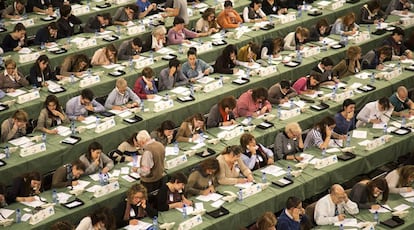The Catalan telethon celebrates its 25th anniversary
‘La Marató de TV3’ raises funds every year for health research initiatives

Over €151 million in raised funds, 723 projects and 6,500 researchers involved. The Catalan public broadcaster’s fundraising TV marathon —known to locals as La Marató de TV3— celebrates its 25th anniversary next Sunday with impressive figures.
The first edition of this telethon was held on December 19, 1992. After six hours on the air, the program raised a little over €1 million for leukemia research. Since then, La Marató has grown to become a global reference.
The most recent editions of La Marató have lasted 15 hours — as will this year’s — and combined entertainment with science outreach. A quarter of a decade later, the Catalan telethon is consolidated as an unique example of televised fundraising in Spain.
Inspired by an American TV format, each year the program focuses on specific diseases in order to improve research. This year, the telethon will use donations to help the fight against stroke and traumatic spinal cord and brain injuries.
La Marató is also “ a living celebration in the streets of Catalonia,” according to its director, Lluís Bernabé. Every year, hundreds of street activities are organized in order to collect money for the cause.
“It is a program that many people love because it is about solidarity, and showcases human experiences as an example of self-improvement,” said Mireia Rom, a volunteer at the 2012 edition, which focused on cancer. “In no way does La Marató want to be paternalistic or make the audience feel pity. The program is educational and aims to improve public knowledge about the disease while shattering a few myths.”
Every year the project relies on more than 2.400 volunteers
The project relies on more than 2,400 volunteers, besides the tens of thousands of viewers who make pledges. An additional 2,000 activities are organized throughout Catalonia to raise funds, and a million people take part in those. Meanwhile, around 220,000 students will attend lectures about the diseases.
Every year, a group of Spanish and foreign artists contribute disinterestedly in La Marató. singing in Catalan for a compilation CD that goes on sale. Some of them also perform during the live program.
elpais.cat in English
From November onward, the Catalan edition of EL PAÍS, Elpais.cat, will include a selection of news stories in English.
The texts will be prepared by journalism students at the Pomepeu Fabra University (UPF), who will be adapting content from Catalan current affairs every week, adding extra information and explanation to these stories so that they can be understood in a global context.
Public awareness and education are two core pillars of the Catalan telethon. “Both factors have a direct impact on knowledge about the diseases and on society’s conviction about the importance of research,” said Bernabé. “Everything that La Marató has achieved in 25 years is because of the story of emotion, effort and trust that’s behind it.”
An audience study carried out in 2014 showed that society’s knowledge about neurodegenerative diseases had increased by 40% after the 2013 edition of La Marató. It is also remarkable that the number of organ donors in Catalonia increased after 2011, when the telethon focused on transplantation. This could be explained by the fact that the education campaigns start with the youngest viewers and then extend upwards to the whole of society.
“The ideal situation would be if this initiative were not necessary in order to finance research. It would have to be the responsibility of government agencies,” says Dr. Antonio Agudo, who leads a project related to diabetes and obesity that received funding in 2015.
La Marató can boast about several scientific achievements, such as the creation of the first bone marrow donors registry in Spain. The first edition of the telethon donated all pledges to the Josep Carreras Foundation, created by the opera singer – known world-wide as one of the Three Tenors – who overcame the disease himself.
“It represented a great leap forward in the way that the Foundation was started. At the national level in Spain, it went from zero to 250,000 bone marrow donors and 60,000 units of umbilical cord blood”, says Antonio García, the foundation manager.
This year’s main theme, stroke, was selected because it affects an average of 17 million people around the world annually. Of these, six million die and the rest suffer various forms of disability.
Tu suscripción se está usando en otro dispositivo
¿Quieres añadir otro usuario a tu suscripción?
Si continúas leyendo en este dispositivo, no se podrá leer en el otro.
FlechaTu suscripción se está usando en otro dispositivo y solo puedes acceder a EL PAÍS desde un dispositivo a la vez.
Si quieres compartir tu cuenta, cambia tu suscripción a la modalidad Premium, así podrás añadir otro usuario. Cada uno accederá con su propia cuenta de email, lo que os permitirá personalizar vuestra experiencia en EL PAÍS.
¿Tienes una suscripción de empresa? Accede aquí para contratar más cuentas.
En el caso de no saber quién está usando tu cuenta, te recomendamos cambiar tu contraseña aquí.
Si decides continuar compartiendo tu cuenta, este mensaje se mostrará en tu dispositivo y en el de la otra persona que está usando tu cuenta de forma indefinida, afectando a tu experiencia de lectura. Puedes consultar aquí los términos y condiciones de la suscripción digital.








































